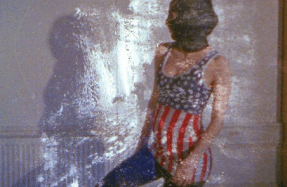
It’s fitting that, like many viewers I’m sure, I fell under a contemplative spell halfway through the three-and-a-quarter-hour runtime of Woodlands Dark and Days Bewitched, Kier-La Janisse’s new documentary about the British “folk horror” genre. Even before one starts the film, its dauntingly expansive treatment announces that it intends to stretch the definition of the genre beyond its most immediate touchstones, the so-called “Unholy Trinity” of Michael Reeves’ Witchfinder General (1968), Piers Haggard’s The Blood on Satan’s Claw (1971), and Robin Hardy’s The Wicker Man (1973). While Woodlands Dark acknowledges the centrality and influence of these films—not least via retrospective interviews with surviving cast and crew members, including an in-depth conversation with the octogenarian Haggard as well as archival footage of Hardy (who passed away in 2016) and Wicker Man screenwriter Peter Shaffer—Janisse pushes boldly past fan-service reverence. Not only does the documentary seek to dislocate the idea of “Britishness” itself as the defining lens for folk horror’s aesthetics and ideas, it also expresses skepticism that folk horror is even a “true” subgenre of the horror film. Rather, taking structural cues from the iconic motif of the Maypole, Woodlands Dark lays out multiple contextual strands that converge around a conception of folk horror as an almost endlessly malleable mode dancing across multiple global cinematic cultures.
The founder and director of the Miskatonic Institute of Horror Studies, Janisse seems to be targeting a very specific community with her exhaustive (even though Janisse intriguingly extends the scope of her inquiries beyond that of Scovell), such that can often feel like an adaptation of its printed predecessor. The more fannish side of the film’s provenance can be spotted in the fact that it is a production of Severin Films, a Los Angeles-based studio and DVD imprint whose catalogue might best be described as the Criterion Collection for cult, underground, and B movies.






